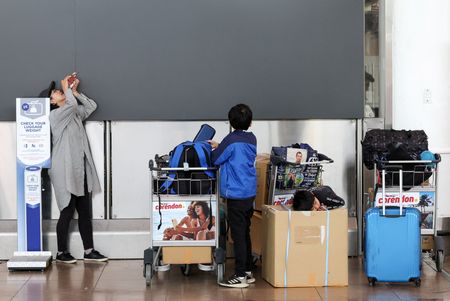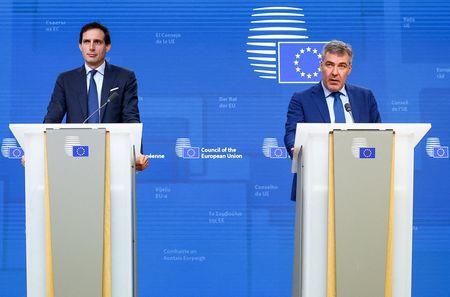BRUSSELS (Reuters) -Belgium called an emergency meeting of key government ministers and security chiefs for Thursday after drone sightings forced closures of airports and a military air base on Tuesday evening in what the defence minister called a coordinated attack.
Drones have caused major disruption across Europe in recent months, forcing temporary closures of airports in several countries. Some officials have blamed the incidents on “hybrid warfare” by Russia. Moscow has denied any connection with the incidents.
Brussels airport, Belgium’s busiest, was closed at around 8 p.m. (1900 GMT) after three drones flew over the airport’s perimeter, Belgian air navigation service Skeyes said.
At around the same time, drones were spotted over the airports in Antwerp, Liege and Ostend, forcing them to shut as well until the early hours of Wednesday morning.
Drones were also seen above the Florennes air base, according to the Defence Ministry.
Brussels Airport briefly reopened after two hours, but then was closed again after at least one drone reappeared. The suspension of flights ended at about 2 a.m.
Defence Minister Theo Francken told a parliamentary committee the incidents appeared to be coordinated to foment disruption, involving large drones flying in formation.
“It is in line with the hybrid techniques seen in other countries. This is not just someone who flies a drone by chance over a military site or airport…There are a number of indications that this was organised in a very structured way.”
Brussels Airport said 81 flights had been cancelled since the initial closure, along with 24 diverted. Almost half the cancellations occurred after the airport was reopened on Wednesday morning because many planes were in the wrong locations. Wednesday’s first departure was around 6.30 a.m.
Liege Airport, a major cargo hub, reopened at 3 a.m., nearly seven hours after it was shut, with five flights cancelled, 37 delayed and eight diverted to other airports.
Authorities in Denmark, Norway and Germany are investigating drone sightings that have temporarily grounded air traffic at the Oslo, Copenhagen and Munich airports since September, although so far few details have been publicly disclosed about what actually transpired in those cases.
(Reporting by Inti Landauro, Charlotte Van Campenhout, Philip Blenkinsop and Tierney Kugel; editing by Mark Heinrich)














